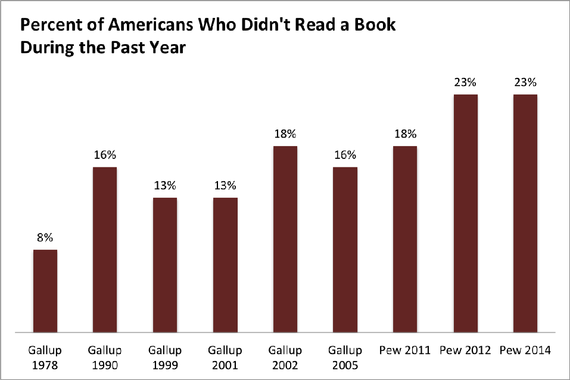The number of American children who say they love reading books for fun has dropped almost 10% in the last four years, according to a US study, with children citing the pressure of schoolwork and other distractions.
The survey of 2,558 US parents and children, carried out for children’s publisher Scholastic and managed by YouGov, found that only 51% of children said they love or like reading books for fun, compared to 58% in 2012, and 60% in 2010. According to the report, in 2014 37% of children said they like reading a little, and 12% said they did not like it at all.
Researchers have found a sharp decline in reading enjoyment after the age of eight. Sixty-two percent of children between six and eight say they either love or like reading books for fun, but this percentage drops to just 46% for children between the ages of nine to 11, with the figure at 49% for 12-14-year olds, and 46% again for 15-17-year-olds. “Reading enjoyment declines sharply after age eight,” reported the publisher.
“I do like reading, but it’s not at the top of things I like to do,” said one 12-year-old boy, responding to the survey. An 11-year-old girl told researchers: “In second and third grade, I read above my grade level and I felt really proud of that. But then the books got bigger and bigger, and it got more intimidating.”
The fifth edition of the biannual Kids and Family Reading Report found more than four in 10 children (44%) said they like reading more now that they are older, with nearly three in 10 (29%) – especially boys (33%, compared to 24% of girls) – liking reading more when they were younger. Sixty per cent of the children who enjoyed reading more when they were younger put this down to the fact there are “so many other things that I now enjoy more than reading”, and 47% blamed the fact that “I have to read so much for school that I just don’t feel like reading for fun”, with others citing the fact they now have to read on their own, rather than being read to.
Scholastic also surveyed the parents of children between the ages of zero and five for the first time this year in an attempt to discover what made children frequent readers. The report found that a six to 11-year-old child is more likely to be a frequent reader if they are currently read aloud to at home, if they were also read aloud to five to seven days a week before starting nursery, and if they are less likely to use a computer for fun.
According to the report, 54% of children up to the age of five are read to at home five to seven days at week, with this declining to 34% of six to eight-year-olds, and 17% of nine to 11-year-olds. But 40% of six to 11-year-olds who are not read to told researchers they wish their parents had continued reading aloud to them.
Overall, 51% of children aged six to 17 were reading a book for fun when surveyed. But three quarters of parents surveyed said they wished their child would read more books for fun, while 71% agreed that “I wish my child would do more things that did not involve screen time”.
“Our research shows that providing encouragement and time both in school and at home for children of all ages to enjoy books they choose to read will help them discover the power and joy of reading,” said Scholastic’s chief academic officer Francie Alexander. “These tactics will also help to motivate kids to read more books, which will improve their skills and open a world of possibilities for them in the future.”

